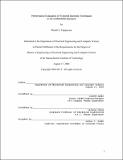| dc.contributor.advisor | Levent Aydin and Lizhong Zheng. | en_US |
| dc.contributor.author | Vajapeyam, Murali S. (Murali Srinivasan) | en_US |
| dc.contributor.other | Massachusetts Institute of Technology. Dept. of Electrical Engineering and Computer Science. | en_US |
| dc.date.accessioned | 2006-03-28T19:52:19Z | |
| dc.date.available | 2006-03-28T19:52:19Z | |
| dc.date.copyright | 2004 | en_US |
| dc.date.issued | 2004 | en_US |
| dc.identifier.uri | http://hdl.handle.net/1721.1/32111 | |
| dc.description | Thesis (M. Eng.)--Massachusetts Institute of Technology, Dept. of Electrical Engineering and Computer Science, 2004. | en_US |
| dc.description | This electronic version was submitted by the student author. The certified thesis is available in the Institute Archives and Special Collections. | en_US |
| dc.description | Includes bibliographical references (p. 123). | en_US |
| dc.description.abstract | This thesis evaluates the performance of two forward-link transmit diversity techniques in the CDMA2000 standard: Space-Time Spreading (STS) and Phase-Sweep Transmit Diversity (PSTD). For each technique, the evaluation consists of conducting 9.6 kbps Markov calls in the field and measuring the mean forward-link fundamental-channel (F-FCH) transmit power required to achieve a 1% frame error-rate (FER) at the mobile receiver. The required transmit power is used to compute an estimate of cell capacity as measured by the number of supported users, assuming a fixed total transmit power at the base station. It is observed that enabling STS increases capacity by up to 80% if all mobiles support STS, but capacity is reduced by up to 20% when fewer than 35% of the mobiles support the technique. The capacity loss results from interference of the diversity-antenna signal on mobiles that do not support STS; such interference causes an F-FCH transmit power increase of up to 1.5 dB in multipath Rayleigh-faded channels, as observed in lab experiments. PSTD, which does not require mobile-specific support, was found to improve cell capacity by 12% according to the field experiments. | en_US |
| dc.description.statementofresponsibility | by Murali S. Vajapeyam. | en_US |
| dc.format.extent | 123 p. | en_US |
| dc.format.extent | 1849915 bytes | |
| dc.format.extent | 1846957 bytes | |
| dc.format.mimetype | application/pdf | |
| dc.format.mimetype | application/pdf | |
| dc.language.iso | eng | en_US |
| dc.publisher | Massachusetts Institute of Technology | en_US |
| dc.rights | M.I.T. theses are protected by copyright. They may be viewed from this source for any purpose, but reproduction or distribution in any format is prohibited without written permission. See provided URL for inquiries about permission. | en_US |
| dc.rights.uri | http://dspace.mit.edu/handle/1721.1/7582 | |
| dc.subject | Electrical Engineering and Computer Science. | en_US |
| dc.title | Performance evaluation of transmit diversity techniques in the CDMA 2000 standard | en_US |
| dc.type | Thesis | en_US |
| dc.description.degree | M.Eng. | en_US |
| dc.contributor.department | Massachusetts Institute of Technology. Department of Electrical Engineering and Computer Science | |
| dc.identifier.oclc | 62522583 | en_US |
